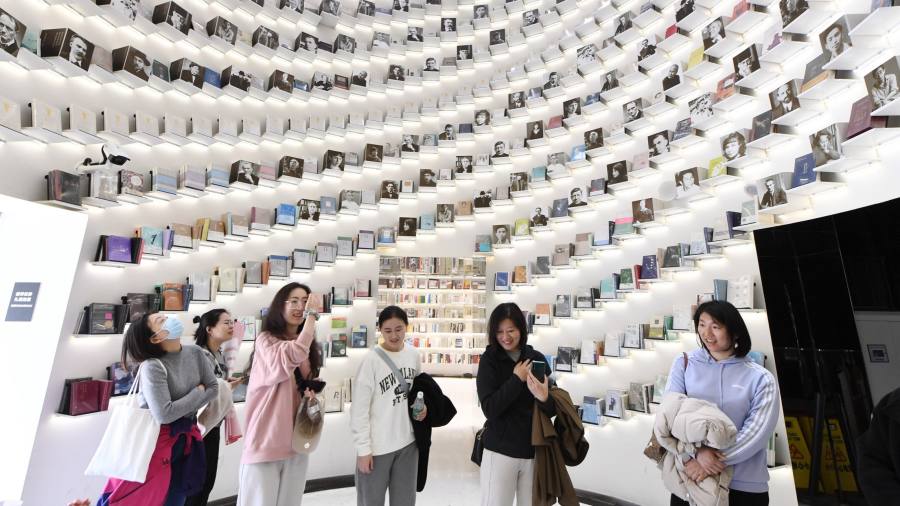Chinese book publishers are releasing far fewer US-themed titles as tensions between the superpowers escalate and Beijing tries to curb what it sees as American influence on its citizens.
Official data reveals that Chinese publishing houses last year rolled out 1,960 titles categorised by the books regulator as related to the US, down more than half from 2018.
The decline came as the regulator — the Chinese Communist party’s central propaganda department — suspended or delayed approval of many popular American authors, such as Michael Lewis. His book The Premonition: A Pandemic Story, a bestseller in the west, failed to find a publisher in China.
The regulator, which issues an official recommendation list of US-themed books, has also sought to promote titles critical of the US, a marked departure from previous years where publications on American culture and tourism topped their recommendations.
“There has been generally a shift in taste in the Chinese market away from a lot of American [topics],” said Jo Lusby, co-founder of Pixie B, a Hong Kong-based consultancy that helps Chinese publishers acquire US titles. “A lot of that is obviously driven by the geopolitical environment.”
American authors, ranging from scholars to business leaders, have long been popular with Chinese readers eager to understand the world’s most advanced economy.
In the mid-2010s, said James Wu, a Beijing-based publisher who had worked with Citic Press Group, China’s largest publisher of business and non-fiction books, companies would acquire the Chinese publishing right of “almost every title” on The New York Times Best Seller list.
“There was so much interest in best-selling American authors that CPG was willing to pay advances worth tens of thousands of copies,” said Wu.
The bonanza came to an abrupt end with the US trade war in 2019, when the propaganda department stopped issuing serial numbers — necessary for publication — to US titles for about six months, said a former editor at CPG.
Just 2,777 US-themed titles were published that year, down from 4,213 in 2018. “At one point you couldn’t even publish Mark Twain’s works,” said Wu.
Although the authority has since lifted the ban, the regulator now takes two months to authorise publication of US-themed books, about four times longer than titles from other countries, according to the former CPG editor.
Publishers have also grown warier of publishing US-related titles written by Chinese nationals. Wu, a fan of Pulitzer Prize-winning history books, said he would not consider publishing these titles as they reflected American values that did not “fit in China”.
Non-political books have also fallen victim to self-imposed censorship. A Shanghai-based scholar said he could not find a local publisher willing to accept his book about the US financial services industry.
“My book is technical,” said the scholar, who plans to release his book in Hong Kong, where regulation is looser, “but domestic publishers still said no for fear [the regulator] may not like US-related topics”.
Multiple book editors said the propaganda department had refrained from defining the red line to give it greater scope to crack down. “In order to control risks and manage uncertainties,” said the former CPG editor, “publishers chose to work on fewer US titles.”
At the same time as restricting American titles, the regulator has made a push to promote titles critical of Beijing’s greatest rival. Recently it has recommended Timothy D Snyder’s Our Malady: Lessons in Liberty from a Hospital Diary and Roger L Martin’s When More Is Not Better: Overcoming America’s Obsession with Economic Efficiency. The regulator did not respond to requests for comment.
Publishers said the shift in tone began four years ago when CPG gained support from the authority to publish The American Trap, a book about “America’s secret economic war against the rest of the world”. It was written by a former Alston executive who was arrested by the FBI on corruption charges.
“That book is a milestone in collaboration between the authority and publishers when it comes to US titles,” said Wu.
Despite the challenges, publishers still see potential for some US titles. Lusby of Pixie B said the huge success of Tara Westover’s Educated, which had sold more than 1mn copies since its launch in China at the end of 2019, suggested titles could be successful “despite being American”.
“If a certain [US] title sits inside the sweet spot of what the government is concerned about, publishers will stay away from it,” she said.
“Otherwise there is still going to be a lot of books coming out of America that are very interesting and politically acceptable and they will work in China.”
Read the full article here




